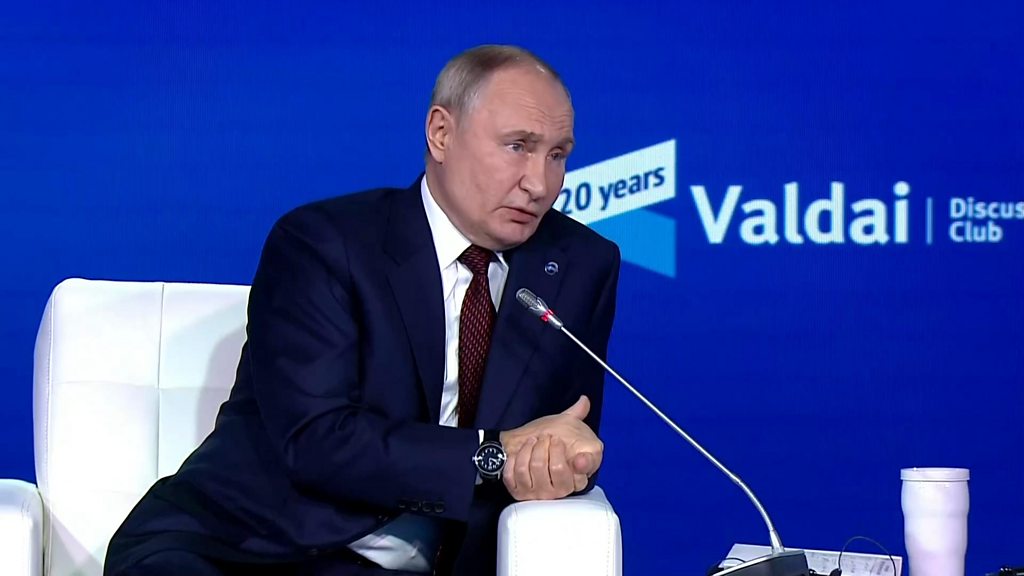As Donald Trump’s election victory recently shocked the world, Russian President Vladimir Putin congratulated the politician, saying he is a “courageous man” and that the Kremlin is prepared for open dialogue. His words, delivered at an event in Sochi, sounded like one of the first steps toward a change in US-Russia relations amid uncertainty over Donald Trump’s foreign policy agenda.
Putin accepts Trump’s challenges and guts
At the summit, Putin hailed Trump’s steadfastness in his first year as president, saying he was “hounded from all sides” but held firm. His comments appeared to put at least a whispered ideological commonality on a shared appreciation for Trump’s fortitude in the face of adversity, an attribute Putin referenced again as he spoke about an effort made earlier this year to take Trump’s life. The Russian leader said that in response to being shot- raising his fist and shouting “fight, fight, fight” he was “courageous, like a man”.
Putin’s speech transmits a message of looking forward to having diplomatic relations with Trump. “We’re ready, we’re ready,” he said as an answer to whether there would be a dialogue between him and the newly elected US president. Trump demonstrated the same openness to dialogue with Putin when he told NBC News the other day, “I think we’ll speak.”
Mixed Response to Trump’s Statement on Ukraine War
Part of Putin’s underlying message concerned Trump’s attitude to the war in Ukraine. In his campaign, Trump promised to end that war “in a day,” though he hasn’t said how he would do that. Putin observed that Trump’s confidence “deserves attention,” creating a cocktail of anticipation and skepticism worldwide.
Trump’s promise to end the war quickly casts a shadow of apprehension over the minds of the Ukrainian and European leaders, for they dread the prospect of losing support from America. ‘Ukrainian President Volodymyr Zelensky voiced cautious optimism after a “warm and productive conversation” with Trump but stressed that the cooperation between Ukraine, Europe, and America should be “productive and positive.”
European Leaders Preparing for Eventual Changes in US Policy
Conversations on Trump’s return to office dominated the talk at the European Political Community summit in Budapest, as leaders of the continent fret over the possibility that this could affect the flow of military aid to Kyiv and have been “vital” for Ukraine’s defense against Russian forces. ‘UK Prime Minister Sir Keir Starmer assured Zelensky that the UK’s commitment to Ukraine remains “iron-clad,” a signal of continuity in European support despite possible policy changes in the US.'(More)
Hungarian Prime Minister Viktor Orban, an ally of the president, welcomed the results, saying he “tapped into the vodka supply happily.” However, he also threatened that “the trade issue with the US will come up, and it will not be easy” – a reference to the more considerable uncertainty surrounding Trump’s proposed 10% tariffs on imports.
Europe Adapts to Greater Self-Reliance in Defense
The Trump presidential campaign bodes ill for decreased American involvement in European security; such rhetoric requires Europe to become more responsible for its defense. Here is what Orban said about Trump’s election: “We cannot expect Americans to be the only ones to take care of us.” Such a statement indicates that there are more excellent attitudes in Europe towards defense self-reliance, especially under the conditions above, which the Trump administration and the resultant drawdown by the US brought about.
Future of Transatlantic Relations Remains Uncertain
As the world awaits Trump’s official return, opportunities cede to challenge, and chances for U.S.-Europe relations lie between optimism and despair. European nations need to walk the fine line between finding closer cooperation with the US while keeping an eye toward taking greater independence on defense and trade matters.’ Meanwhile, leaders such as Putin and Orban signal cautious optimism as they seek to build bridges amidst burgeoning geopolitical tension brought on by Trump’s leadership.’
With Trump and Putin hinting at renewed dialogue, Europe is already preparing for possible changes in US policy on the global stage. It is ready for a challenging period of complex readjustments and realignments.















